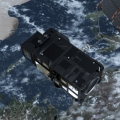|
News:
Kick Off Meeting: 9th October 2015
Mid Term Review: 29-30 November 2016, University of Porto
SCOOP Test Data Set available for Research Use
(see letter)
SCOOP Acceptance Review: 3 December 2018, CLS Toulouse
SCOOP Final Review: 6 May 2019, ESRIN Frascati
Introduction:
SCOOP (SAR Altimetry Coastal & Open Ocean
Performance) is a project funded under
the ESA SEOM (Scientific
Exploitation of Operational Missions)
Programme to characterise the expected performance in the open
ocean and coastal zone of the Sentinel-3
SAR altimeter product generated by the current processing baseline;
and then to test, implement and evaluate improved retrieval methods.
The general
objectives
of the SCOOP are:
- to accurately characterise the expected performance
of Sentinel-3 SRAL SAR mode altimeter products over the open ocean and
coastal zone.
- to develop and evaluate enhancements to the current
baseline Sentinel-3 SRAL SAR data processing schemes, in order to
provide improved performance over the open ocean and in the coastal
zone.
- to support correct interpretation and application of
SRAL SAR L1 products by providing clear technical information on these
products and their processing to the user community.
- to provide recommendations for further developments
and implementations through a scientific roadmap.
In addition there are specific objectives for the Open
Ocean and Coastal Zone studies
as follows:
|

